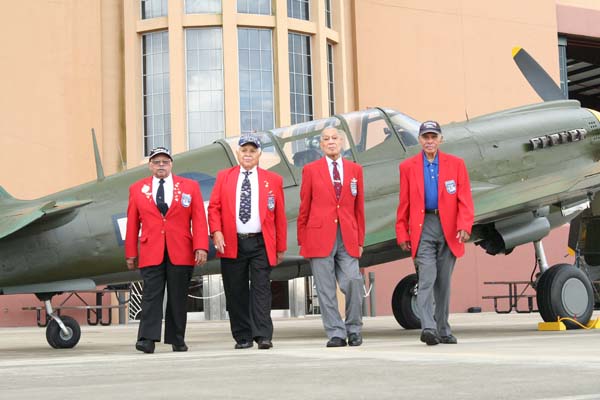

A few weeks ago I had the pleasure of attending an event at Fantasy of Flight with four members of the Tuskegee Airmen. For those who aren't aware, the Tuskegee Airmen were the first group of African-American military aviators. They fought in WWII and although they were risking their lives for our country, they were still subjected to Jim Crow laws. The gentlemen involved in the event were Lieutenant Colonel Leo Gray, Lieutenant Colonel George Hardy, Pilot Daniel Keel and Colonel Charles McGee.
Lt. Col. Hardy reflected back to when he was stationed at Freeman Field. He quickly noticed that German POWs were treated with more respect than the African-American servicemen of the United States. While stationed in Italy, Lt. Col. Gray remembers how the white service men would tell the Italian townspeople stories of how the black service men had tails, would rape their women and eat their children. It seemed that no matter what the sacrifice and which team they were fighting for, the color of the Tuskegee Airmen's skin was still the deciding factor in the acceptance of the heroic men.
Pilot Daniel Keel pointed out to us that the Tuskegee Airmen were one of the first civil rights groups to really make an impact towards the end of segregation and the beginning of equal rights. However they did it without guns, violence or riots. They simply took the stand to be pilots in the war and help fight for their country. Soon after the next wave of civil rights activism started focusing on restaurants, buses and eventually school integration.
Each man had stories of how commanding officers would slowly find reasons to either discharge members of the African-American fighter groups or bully the men straight out of the service. Many of the cadre did not want the Tuskegee Airmen to succeed and were willing to go to great lengths to hold them back and in the ugliest ways possible.
- Perceive - Determine Your Talents
- Prepare - Education is Key
- Perform - Do Your Best Even in the Small Jobs as you Work Your Way Toward Your Goal
- Persevere - Don't Look for Excuses Not To Achieve
The Tuskegee Airmen had to overcome hatefulness by brethren fighting towards an equal goal. Too often I find reasons to be ashamed of my fellow countrymen and on this day, hearing these stories I found more reason. I can only be thankful that I've seen much change over the past 50 plus years and pray we'll see more every year into the future. A gigantic thank you goes out to these four men, nearing 100 years old but still coming out to tell their tales of persevering through discrimination and opening doors for others.
Follow Lee on Facebook: http://www.facebook.com/mysentimentexactlee
Follow Lee's Blog: http://www.mysentimentexactlee.com
